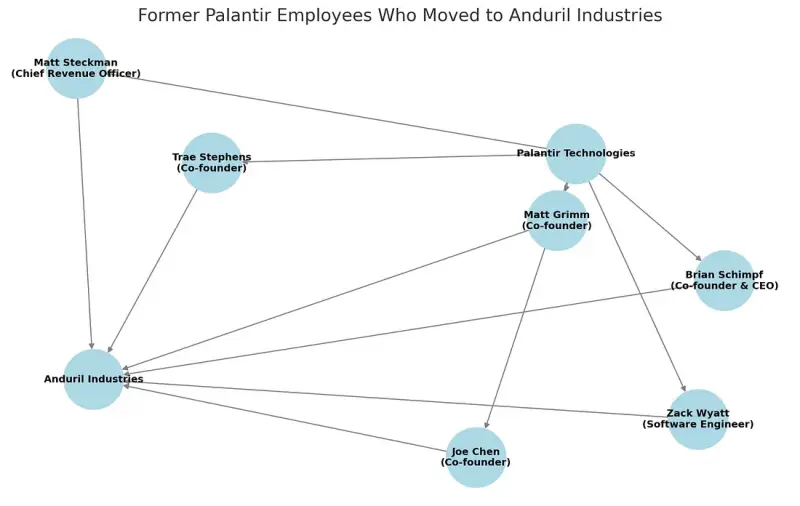
COSTA MESA, CA — Anduril Industries has rapidly positioned itself as a trailblazer in defense technology, championing battlefield automation and AI-powered intelligence. Yet a deeper dive into its financial backers and leadership reveals a disturbing pattern: a company that appears less like an independent innovator and more like an extension of Peter Thiel’s controversial empire.
Thiel’s Network: Anduril’s Hidden Hand
Anduril’s meteoric rise has been fueled in large part by Founders Fund, the venture capital firm co-founded by Peter Thiel — a man whose name is inextricably linked to some of Silicon Valley’s most polarizing controversies. Thiel’s deep-pocketed investment has not only provided Anduril with significant capital but also ensured that its strategic direction aligns closely with his long-held vision for military technology.
A closer look at Anduril’s leadership reveals another telling sign: many of its top executives are former Palantir veterans. Figures like CEO Brian Schimpf, co-founder Trae Stephens, and co-founder Matt Grimm bring with them the operational ethos of a company known for its secretive operations and intimate ties to U.S. intelligence. This continuity suggests that Anduril’s push into autonomous warfare and AI-driven systems is not an organic, independent innovation — it’s part of a broader plan shaped by Thiel’s influence.
Peter Thiel: A Controversial Titan
Peter Thiel is a name that inspires as much debate as it does admiration. Born in 1967 and rising to prominence as a co-founder of PayPal and an early investor in Facebook, Thiel has long been one of Silicon Valley’s most enigmatic figures. His career, marked by groundbreaking success, is also littered with controversies, lawsuits, and scandals that have fueled public debate about the ethics and accountability of tech titans.
One of Thiel’s most notorious moves came in 2016, when he secretly financed Hulk Hogan’s libel lawsuit against Gawker Media — a legal battle that ultimately forced the media outlet into bankruptcy. This covert intervention was widely condemned as an abuse of financial power, raising serious questions about whether Thiel uses his resources to silence critics and shape public discourse.
Beyond his legal maneuvers, Thiel’s political activities have drawn intense scrutiny. A self-described libertarian with contrarian views, he has openly supported candidates and causes that many view as controversial, aligning him at times with elements of the alt-right. His political engagements, coupled with his secretive business practices, have sparked a firestorm of criticism and led to numerous public disputes. Critics argue that Thiel’s aggressive approach to market competition — along with his penchant for secrecy — often skirts the boundaries of transparency and accountability.
The Anduril — Thiel Connection: Strategic or Sinister?
The implications of Thiel’s influence on Anduril are far-reaching. Financially, Founders Fund’s substantial backing ensures that Anduril’s leadership remains closely aligned with Thiel’s strategic priorities. Operationally, the influx of former Palantir executives suggests that Anduril’s drive to secure military contracts and develop cutting-edge, AI-enabled warfare systems is less about fostering true innovation and more about extending Thiel’s reach into the defense-industrial complex.
Anduril’s flagship technology — its proprietary Lattice system — mirrors the functionality of Palantir’s Gotham software, albeit with a sharper focus on battlefield automation. Yet this technological overlap is telling. Both companies operate in the shadows of U.S. military and intelligence operations, thriving on lucrative government contracts and cloaked in a culture of secrecy. Through Anduril, Thiel appears to be consolidating his long-held ambition: to reshape national security by embedding private tech solutions deep within the military’s command structure.
A Cautionary Tale for the Future of Warfare
The convergence of Anduril’s defense ambitions and Thiel’s controversial legacy raises critical questions about the future of military technology. Is the promise of AI-driven, automated warfare simply a rebranded extension of Thiel’s existing influence? When the lines between private innovation and state power blur, who ultimately holds the reins of national security?
For warfighters on the ground, the stakes are incredibly high. The integration of technology from companies with such opaque ties to controversial figures could create vulnerabilities that compromise operational integrity. As Anduril pushes forward with its aggressive expansion into defense, the shadow of Thiel’s past — filled with lawsuits, political scandals, and questionable tactics — looms large, urging caution from policymakers, military leaders, and the public alike.
In the end, the case of Anduril Industries serves as a stark reminder that technological breakthroughs in the defense sector must be scrutinized not only for their innovative potential but also for the sources of their power. When a company’s success is so deeply intertwined with a figure as contentious as Peter Thiel, the promise of progress may come at a far higher cost than anyone dares to imagine.

Add comment
Comments